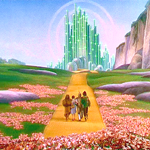 In a New York Press article from August, 2011, film producer and director Tommy Pallotta, said, “I am a fan of audience participation, but I also think audiences like to be told a story. There’s this thing video game designers call a ‘golden path’—there’s a definite way that the majority of people are going to experience the game, and the designers plot that. A lot of the interactivity in a video game is really just the illusion of interactivity. It’s about engaging the audience and giving at least the feeling of volition. But as the artist you have the sense that you are, in some way, controlling it, blending the craft of storytelling with the illusion of agency.” In other words, in a game you think you are controlling the action, but really it’s already been pre-programmed. Kind of like what we think of as destiny. In fact, maybe that’s exactly what destiny is: the path we are meant to take in order to have the most fulfilling experience.
In a New York Press article from August, 2011, film producer and director Tommy Pallotta, said, “I am a fan of audience participation, but I also think audiences like to be told a story. There’s this thing video game designers call a ‘golden path’—there’s a definite way that the majority of people are going to experience the game, and the designers plot that. A lot of the interactivity in a video game is really just the illusion of interactivity. It’s about engaging the audience and giving at least the feeling of volition. But as the artist you have the sense that you are, in some way, controlling it, blending the craft of storytelling with the illusion of agency.” In other words, in a game you think you are controlling the action, but really it’s already been pre-programmed. Kind of like what we think of as destiny. In fact, maybe that’s exactly what destiny is: the path we are meant to take in order to have the most fulfilling experience.
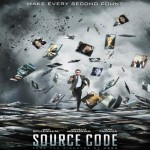 As mentioned in last quarter’s column, there have been a lot of “life-as-illusion” themed movies coming out lately. While I suspect that the success of Avatar and Lost are partly responsible for this trend, I think people’s fascination with 2012, drastic world changes, and a surge in our search for meaning are also fueling the recent string of films about alternate realities and simulated worlds. When airplanes are crashing into buildings, cities are submerged underwater, the Middle East is revolting, and the world economy is collapsing, real life almost seems more fantastical than our dreams. Jon Stewart summed it up perfectly at the 2008 Academy Awards: “Normally, when you see a black man or a woman president, an asteroid is about to hit the Statue of Liberty.” Yes, we are now officially living in the future, and we all know what kind of stuff happens in the future—exactly the kind of stuff that’s happening right now. But at least, thanks to Hollywood, we’ve been warned. And Hollywood’s heads up may even go much deeper than prophesies of events to come. They may help explain the reality we all find ourselves in.
As mentioned in last quarter’s column, there have been a lot of “life-as-illusion” themed movies coming out lately. While I suspect that the success of Avatar and Lost are partly responsible for this trend, I think people’s fascination with 2012, drastic world changes, and a surge in our search for meaning are also fueling the recent string of films about alternate realities and simulated worlds. When airplanes are crashing into buildings, cities are submerged underwater, the Middle East is revolting, and the world economy is collapsing, real life almost seems more fantastical than our dreams. Jon Stewart summed it up perfectly at the 2008 Academy Awards: “Normally, when you see a black man or a woman president, an asteroid is about to hit the Statue of Liberty.” Yes, we are now officially living in the future, and we all know what kind of stuff happens in the future—exactly the kind of stuff that’s happening right now. But at least, thanks to Hollywood, we’ve been warned. And Hollywood’s heads up may even go much deeper than prophesies of events to come. They may help explain the reality we all find ourselves in.
 There have been a lot of “life-as-illusion” themed movies coming out lately. We’ve had Avatar, Inception, and TRON: Legacy, and this month alone there’s The Adjustment Bureau, Limitless, Sucker Punch and Source Code. All these films share themes of alternate realities, questions about what is reality, and insight into powers that might be manipulating the reality we live in. While I hope to discuss the most recent batch of these films in an upcoming column, for now I’d like to bring up one that slipped past the radar of many moviegoers. This film actually gave me goose bumps when it revealed an angle that I’ve only recently adopted, and have never before seen in any other movie. That film is Disney’s Tangled.
There have been a lot of “life-as-illusion” themed movies coming out lately. We’ve had Avatar, Inception, and TRON: Legacy, and this month alone there’s The Adjustment Bureau, Limitless, Sucker Punch and Source Code. All these films share themes of alternate realities, questions about what is reality, and insight into powers that might be manipulating the reality we live in. While I hope to discuss the most recent batch of these films in an upcoming column, for now I’d like to bring up one that slipped past the radar of many moviegoers. This film actually gave me goose bumps when it revealed an angle that I’ve only recently adopted, and have never before seen in any other movie. That film is Disney’s Tangled.
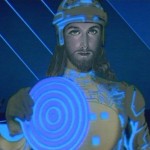 In anticipation of TRON: Legacy, I recently re-watched a bunch of simulation-world films including The Thirteenth Floor, eXistenZ, and the original TRON, which I hadn’t seen in over twenty-five years. While I remember being somewhat confused watching the futuristic Disney film as a kid, seeing it again with new eyes, I was amazed at how clearly it expressed the “life as illusion” theme I’ve been so fascinated by as an adult. In the original movie, Jeff Bridges is considered a “user.” While Bridges often plays users in his films, in this case, it refers to a computer user who manipulates the scenarios of a digital world that is very similar to our own. In the original film, users are considered mythical, messianic figures who can help free the programs from the game they find themselves in. This got me thinking.
In anticipation of TRON: Legacy, I recently re-watched a bunch of simulation-world films including The Thirteenth Floor, eXistenZ, and the original TRON, which I hadn’t seen in over twenty-five years. While I remember being somewhat confused watching the futuristic Disney film as a kid, seeing it again with new eyes, I was amazed at how clearly it expressed the “life as illusion” theme I’ve been so fascinated by as an adult. In the original movie, Jeff Bridges is considered a “user.” While Bridges often plays users in his films, in this case, it refers to a computer user who manipulates the scenarios of a digital world that is very similar to our own. In the original film, users are considered mythical, messianic figures who can help free the programs from the game they find themselves in. This got me thinking.
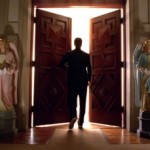 Lost is dead. Long live Lost. And so it ends, in much the same way it began—with a close-up of Jack’s eye, staring straight up past the tall stalks of bamboo that circled the sky above. This time however, that eye would close, and with it, our six-season journey that took us right back to where we started—with questions about a mysterious show that seemed to parallel the mysteries of life. For some, the journey was far more compelling than the destination. For others, it was the perfect resolution and they can walk away feeling fulfilled. Whatever you thought about the conclusion, the one thing most viewers can agree on is that the show challenged us to think in ways we might not have otherwise. In short, Lost was a real trip. And what a long, strange trip it’s been.
Lost is dead. Long live Lost. And so it ends, in much the same way it began—with a close-up of Jack’s eye, staring straight up past the tall stalks of bamboo that circled the sky above. This time however, that eye would close, and with it, our six-season journey that took us right back to where we started—with questions about a mysterious show that seemed to parallel the mysteries of life. For some, the journey was far more compelling than the destination. For others, it was the perfect resolution and they can walk away feeling fulfilled. Whatever you thought about the conclusion, the one thing most viewers can agree on is that the show challenged us to think in ways we might not have otherwise. In short, Lost was a real trip. And what a long, strange trip it’s been.
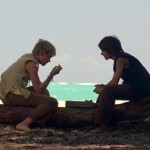 In “Across the Sea,” Lost finally gives us the origins story for Jacob and the Man In Black. The episode was pure, 100% mythology. Those who watched the episode based on the surface story alone were probably disappointed. Let’s face it, taken literally, myths are silly: talking snakes, little boys defeating giants, jealous gods, immaculate conceptions, mortals with superpowers, a sword stuck in a stone, the Force, Never Never Land, Wonderland, Oz, the Matrix, the Island. On the surface, all myths seem like children’s stories. It’s only when we dig deeper that we find the truth worthy of a wise old soul—a soul that knows where it really came from.
In “Across the Sea,” Lost finally gives us the origins story for Jacob and the Man In Black. The episode was pure, 100% mythology. Those who watched the episode based on the surface story alone were probably disappointed. Let’s face it, taken literally, myths are silly: talking snakes, little boys defeating giants, jealous gods, immaculate conceptions, mortals with superpowers, a sword stuck in a stone, the Force, Never Never Land, Wonderland, Oz, the Matrix, the Island. On the surface, all myths seem like children’s stories. It’s only when we dig deeper that we find the truth worthy of a wise old soul—a soul that knows where it really came from.
 You’ve probably noticed that in every flash-sideways so far on Lost this season, the central character of the episode has been shown looking into a mirror. Kate looks at herself in the auto body restroom after discovering that Claire was pregnant, Locke in his own bathroom just before attempting to call Jack, and Jack looks at himself both in the airplane while noticing the strange mark on his neck, and again in “The Lighthouse” when noticing an appendix scar that he doesn’t seem to remember. The easy metaphor of course, is that we are looking at secondary versions of these characters through the looking glass. But what’s the deeper meaning for us?
You’ve probably noticed that in every flash-sideways so far on Lost this season, the central character of the episode has been shown looking into a mirror. Kate looks at herself in the auto body restroom after discovering that Claire was pregnant, Locke in his own bathroom just before attempting to call Jack, and Jack looks at himself both in the airplane while noticing the strange mark on his neck, and again in “The Lighthouse” when noticing an appendix scar that he doesn’t seem to remember. The easy metaphor of course, is that we are looking at secondary versions of these characters through the looking glass. But what’s the deeper meaning for us?
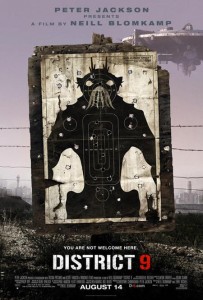 Nobody deserves to suffer. But perhaps we could all use some challenging times to help us grow so we might reach the next level. Maybe the universe is just breaking us down so we can be mended, nudging us towards a more united world. Perhaps this is all preparing us for whatever is to come in 2012 or beyond—the challenges that we may not be ready for now, but after several more beatings will be tough enough to handle. Let’s face it; we’ve become soft, spoiled, greedy, selfish, and lazy. We are just like the pompous Roman rulers before the fall of their empire or the snooty noble class before the French Revolution. In effect, we have become the bad guys.
Nobody deserves to suffer. But perhaps we could all use some challenging times to help us grow so we might reach the next level. Maybe the universe is just breaking us down so we can be mended, nudging us towards a more united world. Perhaps this is all preparing us for whatever is to come in 2012 or beyond—the challenges that we may not be ready for now, but after several more beatings will be tough enough to handle. Let’s face it; we’ve become soft, spoiled, greedy, selfish, and lazy. We are just like the pompous Roman rulers before the fall of their empire or the snooty noble class before the French Revolution. In effect, we have become the bad guys.
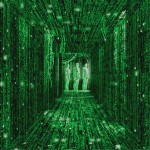 When I first saw The Matrix back in 1999, I instantly became fascinated with its “virtual reality world” concept. At the time, and for many years afterwards, I saw the theme as a metaphor for the illusionary material world we live in—a world of time, space, and the assumption that we are all separate individuals. My belief, in line with what I had taken from kabbalah, was that in reality, we were all one united energy force. Call it God, the light, Buddha, Allah, the universe, sentient energy, whatever. The point was that this energy created our illusionary world in order to experience itself. After all, since it was an all-knowing, all-powerful energy, existence was pretty boring. This energy wanted to experience the one thing it couldn’t know: what it was like to not be it. So, it created an imaginary world of time and space and separated itself there into different material elements that eventually evolved into human beings.
When I first saw The Matrix back in 1999, I instantly became fascinated with its “virtual reality world” concept. At the time, and for many years afterwards, I saw the theme as a metaphor for the illusionary material world we live in—a world of time, space, and the assumption that we are all separate individuals. My belief, in line with what I had taken from kabbalah, was that in reality, we were all one united energy force. Call it God, the light, Buddha, Allah, the universe, sentient energy, whatever. The point was that this energy created our illusionary world in order to experience itself. After all, since it was an all-knowing, all-powerful energy, existence was pretty boring. This energy wanted to experience the one thing it couldn’t know: what it was like to not be it. So, it created an imaginary world of time and space and separated itself there into different material elements that eventually evolved into human beings.
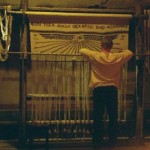 Just as how the Others blindly follow Jacob, we Lost fans have invested five years of our lives blindly following a TV show that has become increasingly intricate. Will our commitment be worth it in the end? Those of us who have faith have stuck with it, but we’ve lost a lot of former believers along the way. What if the series finale is a disappointment and leaves many of the major questions unanswered? Will we question our blind faith in a show that we hoped would give us answers to its convoluted storyline, and beyond? Hopefully we won’t get to that point, but I have some thoughts just in case we do.
Just as how the Others blindly follow Jacob, we Lost fans have invested five years of our lives blindly following a TV show that has become increasingly intricate. Will our commitment be worth it in the end? Those of us who have faith have stuck with it, but we’ve lost a lot of former believers along the way. What if the series finale is a disappointment and leaves many of the major questions unanswered? Will we question our blind faith in a show that we hoped would give us answers to its convoluted storyline, and beyond? Hopefully we won’t get to that point, but I have some thoughts just in case we do.
 In a New York Press article from August, 2011, film producer and director Tommy Pallotta, said, “I am a fan of audience participation, but I also think audiences like to be told a story. There’s this thing video game designers call a ‘golden path’—there’s a definite way that the majority of people are going to experience the game, and the designers plot that. A lot of the interactivity in a video game is really just the illusion of interactivity. It’s about engaging the audience and giving at least the feeling of volition. But as the artist you have the sense that you are, in some way, controlling it, blending the craft of storytelling with the illusion of agency.” In other words, in a game you think you are controlling the action, but really it’s already been pre-programmed. Kind of like what we think of as destiny. In fact, maybe that’s exactly what destiny is: the path we are meant to take in order to have the most fulfilling experience.
In a New York Press article from August, 2011, film producer and director Tommy Pallotta, said, “I am a fan of audience participation, but I also think audiences like to be told a story. There’s this thing video game designers call a ‘golden path’—there’s a definite way that the majority of people are going to experience the game, and the designers plot that. A lot of the interactivity in a video game is really just the illusion of interactivity. It’s about engaging the audience and giving at least the feeling of volition. But as the artist you have the sense that you are, in some way, controlling it, blending the craft of storytelling with the illusion of agency.” In other words, in a game you think you are controlling the action, but really it’s already been pre-programmed. Kind of like what we think of as destiny. In fact, maybe that’s exactly what destiny is: the path we are meant to take in order to have the most fulfilling experience.







 Just as how the Others blindly follow Jacob, we Lost fans have invested five years of our lives blindly following a TV show that has become increasingly intricate. Will our commitment be worth it in the end? Those of us who have faith have stuck with it, but we’ve lost a lot of former believers along the way. What if the series finale is a disappointment and leaves many of the major questions unanswered? Will we question our blind faith in a show that we hoped would give us answers to its convoluted storyline, and beyond? Hopefully we won’t get to that point, but I have some thoughts just in case we do.
Just as how the Others blindly follow Jacob, we Lost fans have invested five years of our lives blindly following a TV show that has become increasingly intricate. Will our commitment be worth it in the end? Those of us who have faith have stuck with it, but we’ve lost a lot of former believers along the way. What if the series finale is a disappointment and leaves many of the major questions unanswered? Will we question our blind faith in a show that we hoped would give us answers to its convoluted storyline, and beyond? Hopefully we won’t get to that point, but I have some thoughts just in case we do.
